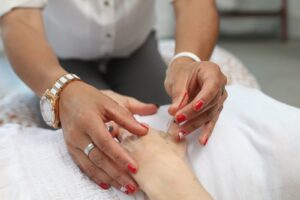Subscribe to the Newsletter
If you are interested in understanding how Traditional Chinese Medicine can improve your life sign up to my newsletter for the latest updates.

Anxiety in its many forms (such as worry, nervousness, concern, disquiet) must be one of the problems acupuncturists see most often. Certainly I’ve treated enough people with it, because acupuncture works really well.
Anxiety often comes with other problems, such as insomnia, depression, low energy, digestive issues, heart palpitations, sweating and so on. It can be the result of other issues, like pain, and itself cause many other sorts of ill-health.
With anxiety, some people can’t stop eating, and others lose their appetite. So people come for anxiety and weight gain and others for anxiety and weight loss. I think the human race is built to be emotional and anxiety takes one form of it.
Acupuncture and anxiety form part of a theory going back at least 3000 years, maybe far more!
Both in theory and as a treatment acupuncture is part of Chinese Medicine, which some of the greatest minds who ever lived gave their lives to. Now, worldwide, people use it more and more. Acupuncture relies on acupuncture points lying along acupuncture channels. (Click here for acupuncture point evidence.)

However, those ancient, and not so ancient, Chinese doctors didn’t treat anxiety as such. They didn’t describe it as ‘anxiety‘.
Instead they analysed and diagnosed each case in terms of Chinese medicine syndromes, which they did know how to treat successfully.
If acupuncturists correctly diagnosed and successfully treated the patient it didn’t matter how Western medicine had described the condition. For example …
So to explain it we’ll need to cover the various ways it can be diagnosed in Chinese Medicine.
Remember, if you want to receive acupuncture the way it’s been given during the last, very successful, 3000 years, you need to see an acupuncturist who knows what he or she is doing. That means you’ll need a PROPER consultation.
If you’re lucky, he or she will be happy to explain their diagnosis and what you can do to help yourself, and what acupuncture can do to speed a reduction in your anxiety and panic or stress levels.
To give a flavour of the kind of words they may use, look at this flowchart below. Theoretically, if someone could answer all the questions on the flowchart correctly, the acupuncturist would arrive at a correct diagnosis and treatment.
You’ll also need to know about Excess and Deficiency. Then it will begin to make sense and you’ll understand how the process – with acupuncture and anxiety – works to your great advantage.
However, the diagnosis is not quite that easy!
Most people have several syndromes at the same time, so the answers aren’t quite so obvious. Still, if you suffer from anxiety, let’s see how you get on with it!
Start with where it says ‘Anxious‘ then go through the flowchart to see where you end up.
(By ‘palpitations’ we don’t mean what your doctor means. We mean, when at rest are you aware of your heart beating so that you can feel it, whether or not it’s fast, slow or stops and starts?)

OK – did you arrive at a conclusion?
In other words, did you end up in one of the square boxes where it says something like ‘Heart Blood Deficiency‘? Even if you did, don’t assume that’s the correct diagnosis. It might be only part of it.
Also … No self-respecting acupuncturist would start treating on the strength of even fairly clear answers to the above questions. Some of the questions beg the question, such as asking you if you’re moody: if you’re anxious, you might well be moody! So the acupuncturist would check the diagnosis in other ways.
He’d assess you by asking other questions and then he would check your pulses and tongue, and possibly do other physical forms of examination, such as checking tension in your abdomen or back, to confirm the diagnosis. (Otherwise acupuncture and anxiety would be too easy, everyone would be doing it and nobody would ever be anxious.)
Only then, after explaining the diagnosis and getting your permission would he begin treatment.
Here are links to many of the syndromes mentioned in the flowchart (many of them help to explain more about acupuncture and anxiety):
One last point … If you’re anxious, you might not have any of these syndromes fully developed. They might be there, but in the background and in time would become serious only if untreated.
And of course, if the source of your anxiety disappeared and you had time to recover, say during a long holiday with friends, or a period of quiet reflection, contemplation or even meditation during a ‘Retreat’, or a week or two of spa treatment, the syndrome might never appear.
However, once the syndrome does appear, it takes longer to shift, and you may find that acupuncture is very effective.
So don’t panic. Help is at hand. If your condition can be diagnosed in terms of any of these syndromes, almost certainly you can be helped.
Such help can be given even if you’re taking medication from your doctor, though your medicines might make it harder to be sure that acupuncture was working. However, good acupuncture would almost certainly improve the underlying syndrome, so in time, your anxiety.
Many people want acupuncture for anxiety because it helps them reduce or stop the medications they’ve been prescribed. Such medication can be powerful and effective, but it often has side-effects that people dislike and for which sometimes they are prescribed even more medication! (If this idea interests you, have a quick read of our page on primary and secondary effects of drugs, herbs and foods.)
By the way … are you scared of acupuncture needles? Have a quick look at the following YouTube video!
Lastly … anxiety both causes, and is caused by a very important syndrome in Chinese medicine called Qi Stagnation. See near this for links to my book about it.

Stay in Touch!
No spam, only notifications about new articles and updates.

Book a Video consultation if you want to know more about your symptoms
You want to know which points to use?
OK, tell me which syndrome(s) you have – from that list above, such as Liver Blood deficiency, or Heart Yin deficiency for example.
Then I’ll tell you which points to try. (Also, other stuff that will help!)
That’s important, because otherwise it’s like taking a map of the world and asking how to get to Rome – without saying where you’re starting from! If you refuse to say where you are, admittedly you might still get to Rome after a while of batting around the world in your aircraft – expensively too! But you probably wouldn’t get there very fast!
Even if you used an acupuncture point often good for generally calming down, such as Baihui Du20, it probably wouldn’t work for long, because you hadn’t deal with the underlying cause of the problem – which would therefore recur. For example, look at Liver Blood deficiency: there’s a syndrome that can lead to or intensify anxiety and nervousness. Treat it right, however, and the inherent cause of the problem goes, and so does the anxiety!

This Introductory Chinese medicine course introduces you to the amazing thinking behind this ancient medicine, now increasingly in demand.

The Scottish College for Chinese medicine provides introductory courses for all, explaining Chinese medicine and its cultural background.

Master Tung’s acupuncture is a hidden treasure, lost to China but recovered in Taiwan from where it spread round the world.

Knee pain has five main causes. It’s certainly worth trying acupuncture before you resort to surgery!
Subscribe to the Newsletter
If you are interested in understanding how Traditional Chinese Medicine can improve your life sign up to my newsletter for the latest updates.
Subscribe to the Newsletter
If you are interested in understanding how Traditional Chinese Medicine can improve your life sign up to my newsletter for the latest updates.